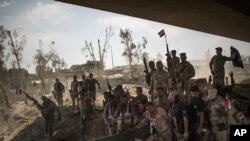Dozens of female relatives of Islamic State (IS) fighters in the refugee camps of Mosul have faced harassment and sexual abuse at the hands of Iraqi security forces, according to a joint report this week by the Network of Iraqi Reporters for Investigative Journalism and the Mosul Investigation Team.
The report, which has been rejected by the Iraqi High Commission for Human Rights (IHCHR), said it documented 16 out of 36 "confirmed" cases of sexual exploitation of female relatives of IS fighters during three months of investigation, including five minors between 15 and 18 years of age.
The report said several of them have committed suicide due to the trauma of the abuse.
"These women are punished on behalf of their fathers, husbands, and brothers who have joined the Islamic State. If they complain against the abuse, they will instantly be accused of terrorism," Dlovan Barwari, the leading writer of the report, told VOA in an interview Friday.
Barwari said the women interviewed reported of being asked for sexual favors by Iraqi security forces and Shiite Popular Mobilization (PMF)or face various forms of harassment including frequent raids , investigation and the confiscation other their personal documents.
While women from wealthier families could avoid this intimidation through bribery, those with limited financial ability had to comply.
"Some houses and tents at refugee camps are turned into brothels where those women are forced to accept sexual exploitation in exchange for $3 or a little food. They are living in a besieged situation with no other options left," added Barwari.
The report accused the Iraqi government of not taking those cases seriously due to the stigma families affiliation to IS fighters. It said aid organizations are also dissuaded from helping the victims due to the fear of being accused of helping IS members.
The mistreatment of the so-called IS families is also justified by many Mosul community members as a fair punishment, the report claimed.
"Punishing the families of an oppressive organization is necessary," Naamat Suleiman, a 30-year-old resident of Mosul was quoted in the report. "This is a lesson to prevent the return of such an extremist organizations to the city in the future."
Government reaction
The Iraqi High Commission for Human Rights has called the report's findings "untrue and contrary to reality on the ground."
Commission member Fadel al-Gharawi in a media statement said the refugee camps hosting IS families are supervised by the Iraqi Ministry of Displacement and Migration and are protected by Iraqi security forces.
"The office of the High Commissioner for Human Rights has investigative, oversight and follow-up committees that conduct occasional field visits to these camps. These committees have not recorded any cases of violation or complaint by women against the forces in charge of the security of the camps," said al-Gharawi.
IS swiftly seized large swaths of Iraqi territory in mid-2014 when the Iraqi army abandoned their posts, starting in Mosul. The group was declared defeated in Iraq in late 2017 after over three years of Iraqi security forces operations supported by the U.S.-led coalition. Since then, the Iraqi government has started what it calls "clean up" efforts such as issuing death penalty for imprisoned IS fighters and placing their family members in refugee camps.
100 thousand members
Official statistics put the number of estimated IS family members to be around 100,000. Most of them are placed in camps that were built by international community for internally displaced civilians fleeing during the Iraqi security forces operations against IS between 2014-2017.
Human Rights Watch has called those camps "de facto prisons" for these so-called IS families. Its senior Iraq researcher Belkis Wille last November called the Iraqi treatment of families with perceived IS affiliations as "short-sighted, fundamentally destabilizing and criminal."
Similarly, Amnesty International last year warned that the sustained mistreatment of these families could lead to a next cycle of violence by the new generation of supporters of the Islamic State.
Report: Iraqi Forces Sexually Abuse IS Female Relatives in Mosul

WASHINGTON —



